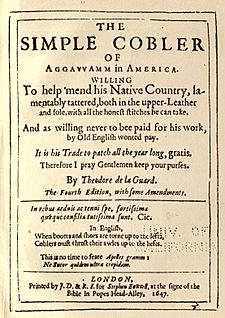Nathaniel Ward facts for kids
Quick facts for kids Nathaniel Ward |
|
 Title page of Ward's book The Simple Cobler of Aggawamm in America (4th ed., 1647) |
|
| Born | 1578 in Haverhill, Suffolk, England |
|---|---|
| Died | October 1652 (aged 73–74) in Shenfield, Essex, England |
| Church | Protestant (Puritan) |
| Writings | Massachusetts Body of Liberties (1641) |
Nathaniel Ward (born 1578 – died October 1652) was an English Puritan minister and writer. He lived in both England and the American colony of Massachusetts.
Contents
Early Life and Education
Nathaniel Ward was born in 1578 in Haverhill, Suffolk, England. His father, John Ward, was also a well-known Puritan minister.
Nathaniel first studied law at Emmanuel College, Cambridge University, graduating in 1603. He worked as a lawyer for a while and traveled around Europe. In a city called Heidelberg, he met a German religious leader, David Pareus, who convinced him to become a minister instead.
Becoming a Minister
In 1618, Ward worked as a chaplain (a minister for a specific group of people) for English merchants in Elbing, Poland. Later, he returned to England. In 1628, he became the rector (a type of church leader) of Stondon Massey in Essex.
Ward quickly became one of the most important Puritan ministers in Essex. However, his strong Puritan beliefs caused problems with the official church. In 1631, the Bishop of London, William Laud, criticized him. Even though he wasn't completely kicked out of the church, he lost his job in 1633 because of his beliefs. Nathaniel's two brothers also faced difficulties for their similar views.
Life in America
In 1634, Nathaniel Ward moved to Massachusetts in America. He became a minister in Ipswich for two years. He then had to stop working because he was not well.
Writing the Body of Liberties
While still living in Ipswich, Ward wrote an important set of laws for the Massachusetts colony. This was called The Body of Liberties. The laws were officially accepted by the government of the Massachusetts Bay Company in December 1641.
The Body of Liberties was the very first set of laws created in New England. It explained what "liberty" meant in ways that were quite advanced for its time. These laws were based on Common Law, a famous English document called Magna Carta, and parts of the Old Testament from the Bible.
However, Ward believed in a system called theocracy, where religious leaders rule, rather than a democracy, where people vote. He once wrote:
The upper world shall Rule,
While Stars will run their race:
The nether world obey,
While People keep their place.
Ward thought that fairness and laws were very important for individual freedom. Some people believe that The Body of Liberties helped start the idea of liberty in America, which later led to the United States Constitution.
The Simple Cobler of Aggawam
In 1645, Ward started writing his second book, The Simple Cobler of Aggawam in America. This book was published in England in January 1647, before Ward went back there. He used a fake name, Theodore de la Guard. Three more versions of the book were published soon after, with important changes and additions.
The Simple Cobbler is a small book. Even though it has some strong and sometimes harsh opinions, it is also described as "full of quaint originality, grim humor and power." This comes from a book called Colonial Prose and Poetry: The Transplanting of Culture 1607–1650 (1903).
This book is considered one of the most interesting literary works from the first half of the 17th century in the English colonies that later became the United States. It was printed again in Boston, Massachusetts, in 1713 and 1843. Ward also wrote several other pamphlets about religion and politics.
Return to England
After the English Civil War ended, Ward returned to England. There, he wrote more pamphlets. One important one was Discolliminium (1650), which criticized the new government called the Commonwealth of England. He questioned whether the government was fair and attacked how quickly people were forced to swear loyalty to it.
Nathaniel Ward became the minister of the church in Shenfield in Essex. He died shortly after, in Shenfield, in October 1652.
 | Frances Mary Albrier |
 | Whitney Young |
 | Muhammad Ali |

